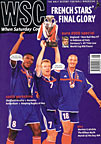 Once the real tournament started, luck played a bigger part than the so-called great players. That's how Cris Freddi saw it anyway
Once the real tournament started, luck played a bigger part than the so-called great players. That's how Cris Freddi saw it anyway
The main theme of Euro 2000, if there was one, changed from round to round. Early on we were talking about the northern European countries going home. The straight lines they played in, how static they were when they received the ball. Meanwhile, the sophisticated southerners controlled the ball in an instant and could play in any position.
The three “quality” sides reached the semis, we were told, along with those old-fashioned Italian cynics who keep besmirching all the purity. There really was some terrifying guff written during the tournament. Jorge Valdano, for instance, told us that “Italy’s style is legitimate but Portugal’s has greatness”. Which Portugal is that, exactly? The “Brazilians of Europe” who overran non-existent English, German and Turkish midfields, or the ones who bravely played only one up front against France.
As for the French, the English media seemed to think it was a hanging offence to suggest they were anything other than the best thing to happen to us in years. Comparisons were made with Platini’s generation, the Germans and Dutch of the Seventies, and assorted Brazilians. The Independent referred to their “infinite majesty”. The well-being of the game, its very soul, depended on them beating the dark forces of negativity in the final.
Oh please. Explain why it is that when Italy man the barricades against Holland, it’s a throwback to prehistoric times, yet when France pick three ball-winners in midfield against Portugal, or resort to the long ball in the last 20 minutes of the final, there isn’t a peep.
It was the earlier high-scoring stuff I couldn’t take seriously. Slovenia losing a three-goal lead, Spain scoring twice in injury time against Yugoslavia. As for Holland’s match with France B, which we were invited to believe exemplified all the good things in the game, it was another basketball exhibition, between two teams who had already qualified.
Only when all the dross had been cleared away and the four best teams were in the semi-finals did this become a genuinely good event. Three of the four packed their midfields because it was exactly the right thing to do – and produced the best games in the tournament. Football isn’t ballet, or figure skating. The deal is that two teams try to beat each other and you pay to watch. That’s it. That’s all of it. If they win with skill and style, all the better – but we’ve got no right to actually expect it.
So it was one thing for Figo and co to swarm all over England and ten Turks, quite another to do the same with that French midfield and back four – and they didn’t. That was one of the main themes of this supposedly great, refreshing tournament: generally speaking, the big names stopped showing it when it really mattered. Raúl’s penalty miss, Figo in the semi-final, Bergkamp against Italy, Del Piero’s misses against France, even the mighty Zidane in the final, dropping deeper and deeper and pinging hopeful long balls.
He will probably be voted European footballer of the year again, but Totti outshone him creatively, Maldini was so good they stopped attacking down that side (he might be quite a player if he ever played a tournament without injury), Toldo was the star of the competition, with Nesta and Cannavaro not far behind.
In the end, the overriding theme was simply the disproportionate importance of luck in these tournaments. France and Portugal survived penalties at important moments in the quarter-finals, Holland needed a late one to beat the Czechs, who hit the woodwork twice. Even Romania hadn’t looked like scoring before they got theirs against England. Against Holland, Italy had so much luck they reminded you of the jury in a Woody Allen film (“we find the defendant incredibly guilty”) – but were unfortunate that the semi-finals were on different days, so they had almost 24 hours’ less rest after playing extra time with ten men.
That was one of the few things the organisers got wrong, as far as I could tell (the referees were superb, the linesmen preternaturally eagle-eyed) – but it made a big difference. The world champions were the strongest team in the tournament, but not in the final. Lucky France. Even their anthem’s still the best.
From WSC 162 August 2000. What was happening this month